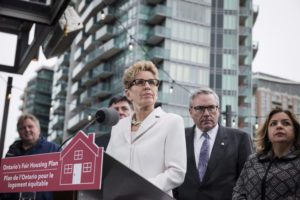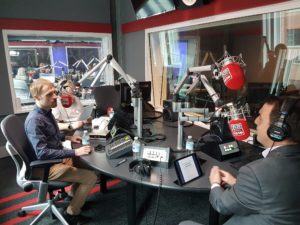
Ontario Premier Kathleen Wynne speaks about Ontario’s Fair Housing Plan during a press conference in Toronto on Thursday, April 20, 2017. (Christopher Katsarov/CP)
Last week the Ontario Liberals released a 16-point plan ahead of this week’s provincial budget aimed to cool the red-hot real estate market in Toronto. With the premier’s approval rating at a woeful 12 percent and a provincial election set for June 2018, it became too politically costly not to do something.
When the government tinkers with the real estate market, there’s always the risk of unintended consequences. It has to walk a thin line between helping first-time homebuyers get into the real estate market and protecting the equity of baby boomers.
Let’s take a closer look at some of the key housing measures and whether millennials come out ahead.
Foreign Buyer’s Tax
Ontario Finance Minister Charles Sousa did an about-face when he announced a foreign buyer’s tax. Just a few short months ago he said a foreign buyer’s tax similar to Vancouver was off the table, but circumstances have changed.
Ever since Vancouver introduced a foreign buyer’s tax, home prices have been soaring in Toronto. Home prices were up 33 percent year-over-year in March. At this rate, if continued home prices would double every 3 years. The rapid price appreciation isn’t just limited to the GTA. London, Ontario is seeing bidding wars similar to Toronto. Home prices in Barrie are up even more than Toronto – almost 40 percent year-over-year.
The Ontario Liberals have learned from Vancouver’s hastily introduced foreign buyer’s tax and got it right with the 15 percent tax on non-residents buying in the Greater Golden Horseshoe. (It’s unfortunate we don’t have the data to see how many foreign homebuyers there are, but even if we did, I’d suspect the number would be higher than government stats indicate.)
Foreigners who contribute to Toronto’s economy, such as international students and the foreign doctor who works at Sick Kids Hospital, are exempt. (You can even apply for a full rebate of the tax if you decide to become a Canadian citizen.) I’m sure there will be some foreign buyers who figure out how to skirt the rules, but it’s the best the Ontario Liberals could have done and should help slow the rapid price appreciation at least a bit.
Vacant Homes Tax
The city of Toronto has long complained about it lack of municipal power. Toronto Mayor John Tory once characterized asking the province for help as “a little boy going up to Queen’s Park in short pants.”
Although the premier denied our mayor’s request for road tolls, he has something to celebrate. The province is allowing Toronto and other municipalities to introduce a vacant homes tax. The tax is designed to encourage homeowners to rent out their homes instead of leaving them empty, helping elevate the tight rental market. (Vancouver recently introduced an empty homes tax, which will come into effect this year.)
Although it’s great in theory, how will the city enforce it? My suggestion is to monitor the utility bills of homeowners. Anyone who’s not using heat, hydro or water and isn’t paying the vacant homes tax should be investigated. How effective this tax will be remains to be seen, but it should help bring some vacant properties into the rental market and may lead to more listings for homebuyers.
Curbing Speculation
The province is cracking down on speculation in the real estate market. Sousa specifically mentioned assignment clauses, where buyers “paper flip” properties before the deal even closes.
The province also wants to ensure people are paying their fair share of taxes. When someone is flipping houses, the full amount should be taxable. The problem is some people are claiming their profits as capital gains, when it should be taxed as business income. The province will be working closely with the taxman to help spot the tax cheats.
Waiving the Land Transfer Tax for First-Time Homebuyers

I’m a guest on the Tim Hudak Show.
Last week I was a guest on the Tim Hudak Show to discuss my book, Burn Your Mortgage. Tim asked me an interesting question. If I could make a recommendation to the premier to make housing more affordable for first-time homebuyers, what would it be? (It wouldn’t be borrowing a page from B.C.’s playbook and introducing a way for first-time homebuyers to get more in debt.)
When buying a home, closing costs are anything, but a drop in the bucket. In fact, homebuyers typically spend up to 4 percent of a home’s purchase price on closing costs. The biggest one is land transfer tax. Last year the Ontario Liberals doubled the maximum provincial land transfer tax rebate for first-time homebuyers, but in my opinion that doesn’t go far enough. If you’re buying a home in Toronto, you’ll still have to pay provincial land transfer tax if you spend more than $368,000. (Good luck finding a home for under $368,000 in the GTA!) My recommendation for the premier is to waive provincial land transfer tax entirely for first-time homebuyers.
Toronto has the dubious honour of being the only city in Canada to have a municipal land transfer tax. Although the municipal land transfer tax has been a financial windfall for the city, it has led to a chronic shortage of listings. Just to move across the street, a homeowner could shell out $30,000 or more in land transfer taxes. Not surprisingly, many homebuyers are choosing to renovate their homes instead selling. Not only are there fewer homes for sale, starter homes are disappearing. Bungalows are being topped with second stories. What was once an affordable entry point for property virgins is now financial out of reach.
Asking the cash-strapped city of Toronto to scrap the land transfer tax is probably out of the question, but if the province were to waive the provincial land transfer tax for first-time homebuyers, I’d pressure the city of Toronto to follow suit. The city failed to match the province’s doubling of the land transfer tax rebate, so perhaps the province could sweeten the offer with extra money for affordable housing and allow the city to introduce new taxes like road tolls to make up for the shortfall.
The Bottom Line
Ontario’s 16 point plan should help with the real estate market, but it’s no silver bullet. The real issue is a lack of supply. Home prices will continue to rise until this issue is addressed. Over 100,000 immigrants move into Toronto each year as we move closer to becoming a world class city. We need to find a place for these people to live.
Although the new “housing supply team” is a step in the right direction, we need to streamline the approval process for developers and get shovels in the ground sooner rather than later. The city needs to work with the province and the federal government to come up with creative housing solutions. For example, laneway houses, when done right could help add some much-needed supply into the housing market.
It’s time for politicians to act, otherwise Toronto could soon become a city of renters similar to cities like New York and Hong Kong.
Sean Cooper is the bestselling author of the book, Burn Your Mortgage: The Simple, Powerful Path to Financial Freedom for Canadians, available now on Amazon and at Chapters, Indigo and major bookstores, and as an Audiobook on Amazon, Audible and iTunes.